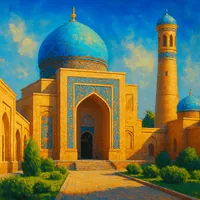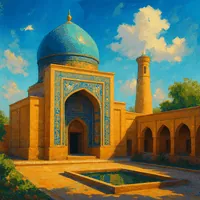Nukus, the enigmatic capital of Karakalpakstan in Uzbekistan, uniquely stands out as a bastion of art amidst the stark desert landscape. Renowned for its extraordinary Savitsky Art Museum, Nukus houses the world's second-largest collection of Russian avant-garde art, assembled clandestinely by Igor Savitsky during the Soviet era. This trove of suppressed art juxtaposed with the arid allure of the nearby Aral Sea makes Nukus a singular nexus of culture and environmental history.
Notable points about Nukus
- Unique Museums: Nukus is home to the Karakalpakstan State Museum of Art, also known as the Savitsky Museum. It boasts the world's second-largest collection of Russian avant-garde art, providing an unexpected and thrilling experience for art enthusiasts from around the globe.
- Remote Desert Tranquility: Situated in the heart of the Karakalpakstan region, Nukus offers a serene desert backdrop. This tranquility and isolation make it a unique retreat for couples seeking a peaceful getaway, away from the hustle and bustle of more touristic locations.
- Cultural Diversity: As the capital of Karakalpakstan, Nukus is a melting pot of Uzbek and Karakalpak cultures. Visitors interested in anthropology and cultural studies will find the city a rich tapestry of customs, traditions, and languages different from other parts of Uzbekistan.
- Historic Ties to the Aral Sea: Once a thriving fishing community due to its proximity to the Aral Sea, Nukus now stands as a testament to the dramatic environmental changes in the region. This makes it a fascinating study location for environmentalists and historians alike.
- Culinary Adventures: The city offers an array of unique dishes that combine traditional Karakalpak and Uzbek flavors, perfect for food lovers eager to explore diverse gastronomic delights. The local markets are perfect places for families to sample fresh produce and unique spices.
- Modernist Architecture: Unlike many cities in Uzbekistan known for ancient Islamic architecture, Nukus features Soviet-era modernist architecture. This characteristic appeals to architecture enthusiasts and students studying comparative architectural styles.
- Educational Hub: Nukus boasts several institutions of higher education, including the Nukus State Pedagogical Institute. This makes the city particularly interesting for students and academics seeking educational opportunities in unique disciplines such as desert studies and regional history.
- Outdoor Activities: Surrounded by natural landscapes, including the Ustyurt Plateau and the Kyzylkum Desert, Nukus presents ample opportunities for outdoor activities such as hiking and bird watching, appealing especially to adventurous singles and nature lovers.
- Art Collectors' Paradise: With its famous art collections and frequent exhibitions, Nukus attracts art collectors and dealers who are interested in expanding their collections with unique pieces from Central Asia.
- Community Resilience: The spirit of community and resilience among Nukus's residents, despite the economic and environmental challenges they face, offers a unique inspiration for those interested in social studies and demonstrations of human perseverance.



